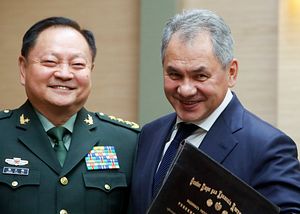China and Russia kicked off a joint anti-ballistic missile defense computer-simulated command post exercise in Beijing on December 11, the Chinese Ministry of Defense (MoD) said in a statement. The drill, dubbed Airspace Security 2017, is the second such exercise held by the two countries and is expected to conclude on December 16.
The Sino-Russian drill coincides with a joint two-day ballistic missile defense exercise involving the militaries of the United States, the Republic of Korea (ROK), and Japan. The Airspace Security 2017 exercise aims to bolster anti-missile defense cooperation between China and Russia, including planning joint missile defense operations.
The exercise is “a pragmatic gesture of important mutual understanding in terms of bolstering Russian-Chinese cooperation in air defense reached by the two countries’ leaders,” the Chinese MoD statement reads. This includes strengthening joint responses to regional ballistic and cruise missile threats.
“China and Russia oppose the development of a global anti-missile system and the cooperation on the anti-missile field would help protect both countries’ security as well as the regional strategic balance,” according to the Chinese MoD. The exercise contributes to both countries’ security as well as the regional strategic balance, the MoD adds.
According to the Russian Ministry of Defense, the drill aims to practice anti-ballistic missile defense command and control operations and rapid joint responses to “accidental and inflammatory strikes of ballistic missiles.”
Both countries insist that the exercise does not target any third countries.
Prior to last year’s exercise, held in May 2016 in Moscow, both countries urged the United States and South Korea to cancel plans to station Terminal High Altitude Area Defense (THAAD) batteries on the Korean Peninsula. The United States began deploying the first THAAD system in March 2017, which temporarily led to a diplomatic rift between South Korea and China.
Beijing and Moscow have called the deployment “reckless” and likely to destroy “the strategic balance” on the Korean Peninsula and in the region. They also criticized the recent U.S.-ROK-Japan missile defense exercise. “Carrying out military training in regions surrounding North Korea will only heighten hysteria and make the situation unstable,” Russian Chief of the General Staff of the Armed Forces General Valery Gerasimov said during a visit to Japan on December 11, Reuters reports.
China and Russia have a comprehensive strategic partnership but not a military alliance. “This handicaps deeper military cooperation between the two countries and makes exercises that practice complex integrated military operations difficult if not impossible to conduct,” I explained previously.
The practical benefits of Airspace Security 2017 for both militaries are likely to be small. For example, it is unclear whether the exercise will involve trying to streamline intelligence-sharing mechanisms, including the real-time sharing of missile threat data, in order to better facilitate the detecting and tracking of incoming ballistic missiles.
Indeed, both sides repeatedly stress the non-alliance aspect of their military cooperation. “Partnership is quite different from alliance. China and Russia have maintained the comprehensive strategic partnership for peaceful purposes, and they are equal,” a Chinese military expert told the Global Times on Monday.
Neither China nor Russia revealed the military units involved in the exercise.

































